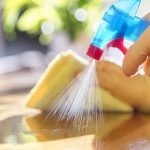WARNING: Study shows exposure to household cleaning products may be as harmful as car exhaust
 (NaturalHealth365) Inherent in the phrase “cleaning product” is the idea that, upon using it, your space will become free of dirt, grime, and toxins. Unfortunately, in the latter case, that may not always be true. With COVID-19 bringing what we might call the “age of cleaning” into our homes, workplaces, and schools, we now coexist with a bunch of unwanted chemicals.
(NaturalHealth365) Inherent in the phrase “cleaning product” is the idea that, upon using it, your space will become free of dirt, grime, and toxins. Unfortunately, in the latter case, that may not always be true. With COVID-19 bringing what we might call the “age of cleaning” into our homes, workplaces, and schools, we now coexist with a bunch of unwanted chemicals.
Ironically, given that COVID is a respiratory disease, all this cleaning might actually be worse for our airways than doing nothing. A recent study found that commercial disinfectants can decrease indoor air quality and increase pollutants in both gas and aerosol form.
Scientists find most cleaning products may do more harm than good
Anyone who has ever stepped into a commercial building after the cleaning staff finished their work is then left with no doubt: that chemical smell is a very unhealthy feeling. With the use of strong disinfectants, that sharp smell is quite intense and, in many cases, sickening. Make no mistake about it: those synthetic scents are meant to cover up the cancer-causing chemicals within those products.
The study’s authors carefully mimicked the indoor conditions of cleaners while taking measurements in real-time. What they discovered should shock all of us!
Household cleaning aerosols may emit more harmful VOCs than cars, according to new study
Researchers discovered that commercial cleaning agents were detected in the air within minutes of their application to a surface. This was also noted to be in well-ventilated areas that convincingly duplicated those of a large office building. They measured a variety of pollutants, including oxidants, radicals, and aerosols, among others. In some cases, chemical concentrations were more than double that of normal outdoor amounts – without the same room to disperse.
Why does that matter? In the study, researchers found that all those chemicals got sucked into human lungs. In fact, they deposited at rates comparable to or worse than that of aerosols inhaled from cars.
Who is at risk of developing adverse health effects from exposure to cleaning products?
The short answer is that everyone is at risk with ubiquitous chemicals such as these. The longer answer is that we should be most concerned about people working with them routinely – cleaning staff, for example. Some of them spend all day, every day, using chemicals to disinfect common touchpoints throughout the office. They may also spend extra time disinfecting bathrooms and eating areas.
In addition, let’s remember that due to the persistent COVID fear-mongering campaign, millions developed cleaning paranoia over the past two years – despite learning early in the pandemic that SARS-CoV-2 spreads by aerosolized droplets, not by touching surface areas.
This means that attacking every office space as though COVID or other diseases are lurking on its surfaces may actually be counterproductive to our wellbeing.
Redefine “clean” by saying NO to toxic chemicals
That’s not to say cleaning is bad. We all intuitively understand the benefits of a clean home or workspace for mental health, and it turns out to be good for your immune system. But, be advised, take time to read product labels and opt for safer alternatives when purchasing cleaning products to be used in your home.
We also need to follow science’s cues about which cleaning methods do and do not matter. Hopefully, this can be our wake-up call that adding toxic chemicals to indoor spaces won’t help fight a disease whose transmission isn’t affected by the use of these chemicals at all.
Sources for this article include:



